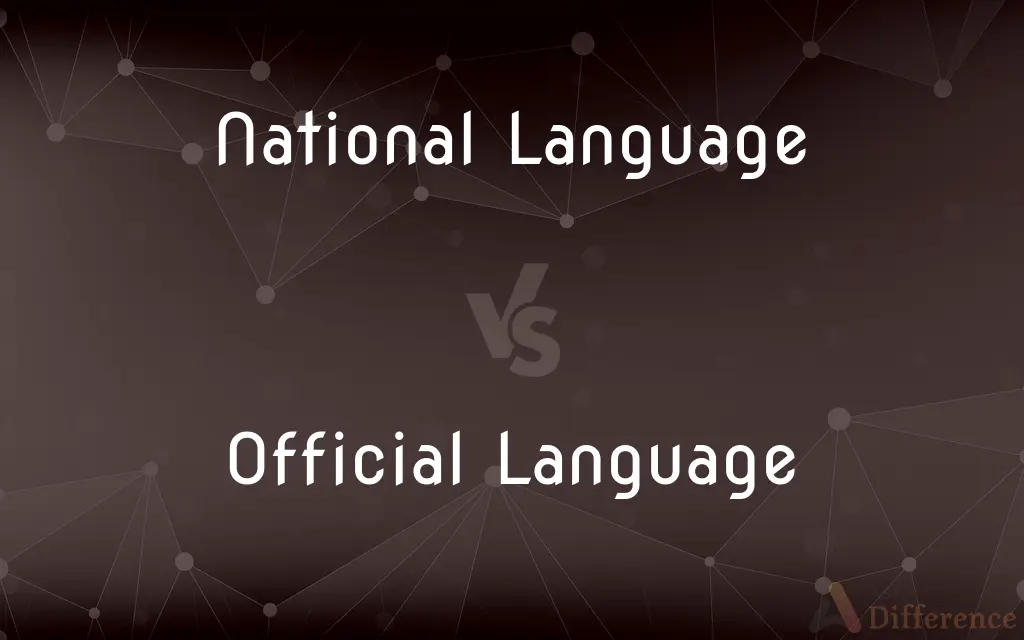National Language vs. Official Language — What's the Difference?
By Tayyaba Rehman — Published on October 26, 2023
National Language is identified with a nation, reflecting its culture. Official Language is legally designated, used in government and official documents.

Difference Between National Language and Official Language
Table of Contents
ADVERTISEMENT
Key Differences
A National Language typically serves as a symbol of national unity and identity. Often, it’s a language historically associated with a country’s heritage and is recognized for its cultural implications and societal influence. On the other hand, an Official Language is typically designated by the legal system of a country and is utilized in its governmental functions. This involves its use in official documentation, legislative proceedings, and administrative matters.
While national language may not be spoken by all citizens, the national language often has historical and sentimental significance. An official language is formally recognized in a country’s constitution or legal framework and is used for official communication within the government and between the government and its citizens.
Comparison Chart
Legal Status
May not have legal status
Legally recognized and adopted
Usage
Cultural and societal symbol
Used in governmental and official communications
Purpose
Expresses national identity and unity
Facilitates administrative, legal, and official functions
ADVERTISEMENT
Representation
Represents cultural or historical aspect
Represents official and formal communication
Adoption
May not be spoken by entire population
Is standardized and used for formal governance
Compare with Definitions
National Language
Not necessarily used in official contexts.
Hindi, though a national language, is not used officially in every Indian state.
Official Language
Utilized in international relations.
English and French are both working official languages of the United Nations.
National Language
May lack legal or constitutional status.
English is a de facto national language in many countries but may lack legal status.
Official Language
A language used for governmental functions.
English is the official language of many international organizations.
National Language
A language symbolizing a nation's identity.
Urdu is the national language of Pakistan.
Official Language
Adopted through legislation or constitution.
French is defined as the official language in France’s constitution.
National Language
Expresses and preserves cultural heritage.
Welsh is preserved as a national language to protect cultural heritage.
Official Language
Used in official and legal documents.
Laws in Canada are published in two official languages, English and French.
National Language
Not always spoken by the majority.
In the USA, there is no declared national language.
Official Language
May not be the most widely spoken language.
In India, Hindi is an official language, despite numerous languages being spoken.
Common Curiosities
Can a National Language and Official Language be the same?
Yes, in some countries, they can be the same, such as in France.
Can a country have more than one Official Language?
Yes, like in Canada where both English and French are official.
Can a language gain Official Language status?
Yes, through legislative processes and amendments.
Does a National Language need legal recognition?
Not necessarily, it might be recognized for its cultural significance.
Is a National Language always the majority-spoken one?
No, it’s often a cultural identifier, not necessarily the most spoken.
Does every country designate an Official Language?
No, some countries operate without a designated official language.
Is English the National Language of the USA?
No, the USA does not have a declared national language.
Do Official Languages impact educational systems?
Yes, often being the medium of instruction or included in curricula.
How is a National Language determined?
Often through historical, cultural, and social factors.
Are Official Languages always indigenous to a country?
No, for example, English is an official language in numerous non-English-native countries.
Can Official Language status be revoked?
Yes, through legislative changes and legal amendments.
Is the National Language used in governmental functions?
Not always, especially if it differs from the official language.
Is it mandatory to know the Official Language?
It can be required for certain civic activities like voting or government jobs.
How does a National Language impact a country’s identity?
It often symbolizes cultural heritage and historical continuity.
Can a National Language change?
Yes, though rare, shifts in cultural dynamics might influence it.
Share Your Discovery

Previous Comparison
Chicken Tenders vs. Chicken Fingers
Next Comparison
Zinc Citrate vs. Zinc GluconateAuthor Spotlight
Written by
Tayyaba RehmanTayyaba Rehman is a distinguished writer, currently serving as a primary contributor to askdifference.com. As a researcher in semantics and etymology, Tayyaba's passion for the complexity of languages and their distinctions has found a perfect home on the platform. Tayyaba delves into the intricacies of language, distinguishing between commonly confused words and phrases, thereby providing clarity for readers worldwide.
















































